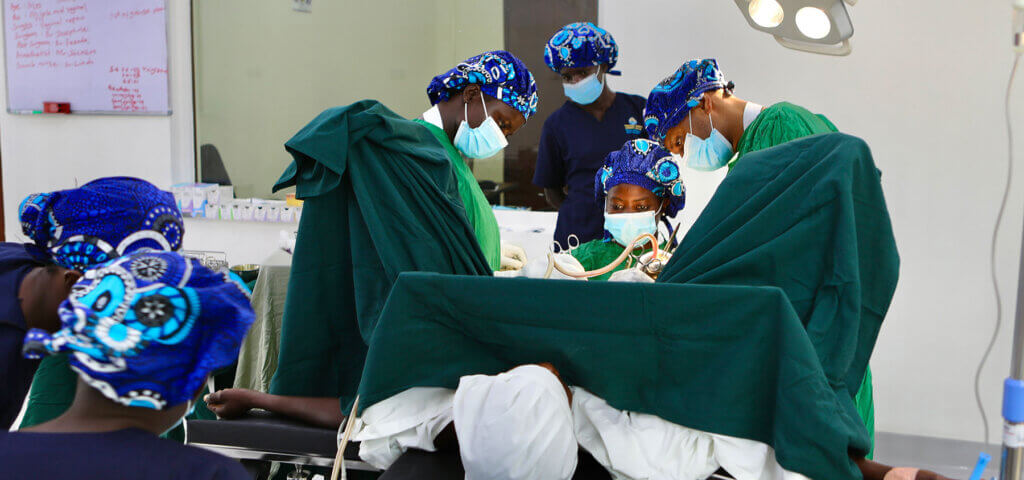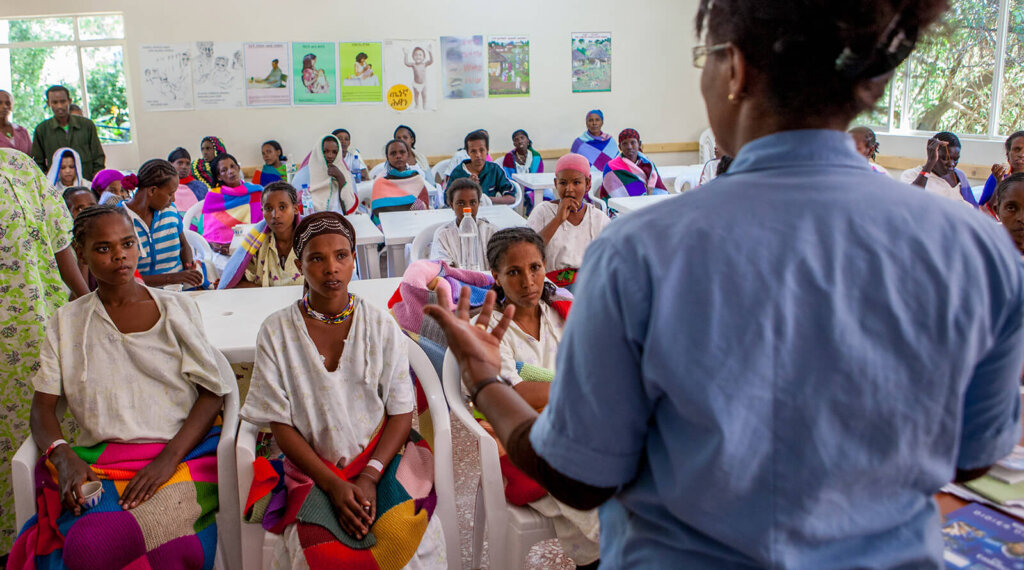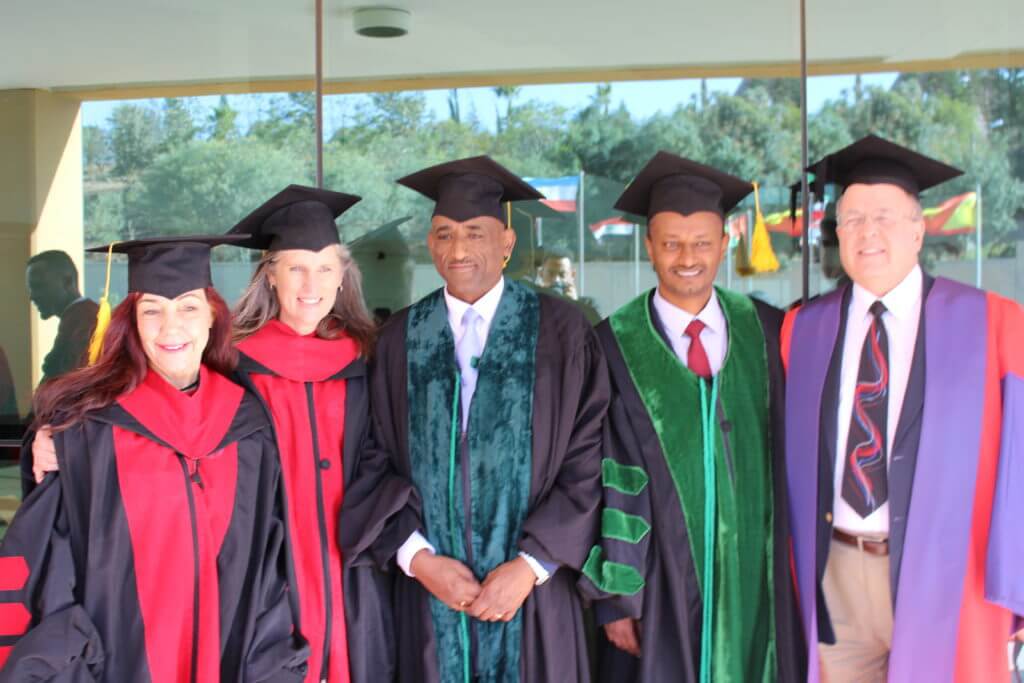Education and improving lives are at the core of what we do.
Building confidence, skills, competence and hope helps women prepare for thriving futures; professional education prepares providers to take good care of these women needing repair and recovery.

Patient Education and Reintegration
All maternal Health Fund recipients agree to provide holistic care that repairs the bodies and spirits of women recovering from childbirth injuries, including continued education.
Emotional support from staff and peers at TWCH continues after surgery and recovery. Reintegration involves preparing women and girls to return home with a sense of wholeness, competence, self-worth, motivation and empowerment. Classes prepare them with knowledge about small business development, literacy, numeracy, crafting and other skills. Using those tools, they can enhance their livelihood, take care of their futures and reclaim the strength that their injuries drained from them.

Educating Doctors and Other Health Professionals
In Sub-Saharan Africa, there have been few doctors trained to treat women’s childbirth injuries. Why? Because there are so many other health issues – and the work does not pay well.
Thanks to MHF, medical training is now more available and supported. This includes doctors’ fellowships and training nurses. Since the opening of the Addis Ababa Fistula Hospital, MHF has been committed to training doctors to treat childbirth injuries around the world. TWCH is an excellent environment for competency training so surgeons can change women’s lives with fistula repairs.
Our doctors travel the world to train obstetricians/gynecologists, urologists, surgeons, physical therapists and nurses who work in areas where obstetric fistula is still a threat to women’s health.
Training Surgeons Beyond Fistula Repair
Maternal Health Fund pays for the training of surgeons, who become leaders in the treatment of obstetric fistula. But fistula is not the only childbirth-related injury that plagues women who lack access to maternal healthcare. In partnership with Mekelle University, Oregon Health & Science University’s (OHSU) Footsteps to Healing, and Worldwide Fistula Fund, we have initiated a fellowship to introduce the discipline of urogynecology. Only the U.S. and Germany previously offered this specialty; now Ethiopia can train doctors to treat a broader range of childbirth injuries.
Interview with Dr. Karen Gold
Maternal Health Fund sat down to interview one of our board members, Karen Gold, MD, who is on the Fellowship faculty, to learn more about uterine prolapse, a devastating condition that is very prevalent among women in Ethiopia.
Maternal Health Fund (MHF): Thank you for your time today, Dr. Gold. Let’s start with the basics. What is urogynecology?
Dr. Gold: Urogynecology is a relatively new medical sub-specialty that is a crossover between urology and gynecology. Urogynecologists, like me, can do a number of pelvic reconstructive surgeries to treat incontinence, repair obstetric fistula, and other similar procedures.
MHF: What is the need for greater training in Ethiopia?
Dr. Gold: The need for additional training became clear several years ago. A clinical study conducted in Ethiopia determined that while fistula is prevalent, another childbirth injury—uterine prolapse, or prolapse for short—was much more common.
MPH: What is uterine prolapse? Does it have the same devastating effects as obstetric fistula in Ethiopia?
Dr. Gold: Prolapse is a childbirth injury, like fistula. Though unlike fistula, prolapse develops over time and is often the result of a combination of factors including multiple births and difficult manual labor that can do a number on women’s pelvic floor muscles and connective tissue. These become weakened to the point where they are unable to keep the uterus in place. In Stage I or II of these conditions, women may feel increased pelvic pressure and discomfort and suffer from incontinence. In later stages, the uterus can protrude from the vagina, making intercourse impossible and significantly decreasing a woman’s quality of life. Like with fistula, once an Ethiopian woman is unable to have children, the likelihood of divorce and abandonment by her husband rises sharply.
MHP: Can uterine prolapse be cured?
Dr. Gold: There are surgical methods to repair prolapse, but unfortunately, about one-third of these surgeries fail. This is especially true in cases like the ones we see in Ethiopia that are very advanced and have been untreated for many years. Traditional prolapse surgeries would just remove the uterus and do minimal repair, but to be effective, this surgery requires more complex reconstructive procedures. The Urogynecology Fellowship Program trains doctors to repair prolapse effectively.
The good news is that once doctors are trained to treat prolapse, the procedure is often easier than repairing some of the more difficult fistula surgeries that these doctors face. At earlier stages, there are even non-surgical treatment options available that women can use and physical therapy that women can do to improve their condition.
MHP: What is your role in training doctors to treat prolapse?
Dr. Gold: Because urogynecology is new to Ethiopia, U.S.-certified urogynecologists were recruited to conduct training and classes. I was brought onto the fellowship faculty along with other urogynecologists from OHSU and Washington University. [In addition to teaching], the faculty is also responsible for the oral and written exams that physicians must pass to graduate. Our first two fellows graduated earlier this year, Dr. Fekade Ayenachew, Medical Director, International Fistula Association (IFA), and Dr. Melaku Abriha from the Hamlin Fistula Center in Mekelle.

Drs. Roentgen and Gold with Urogynecology graduates, Drs. Fekade Ayenachew and Melaku Abreha, and Dr. Wall (left to right) August 2018
MHP: What role do you see Maternal Health Fund playing to address the challenge of prolapse in the years to come?
We hope that many more local doctors become certified urogynecologists and are able to treat prolapse in their country. We also hope that awareness of prolapse increases in communities across Ethiopia. When women are at the beginning stages of the condition, there is so much more we can do. But, if women do not know what to look for, they might not go into the clinic until their symptoms are severe and their injury is advanced. By that point, major surgery is the only option available.
Community Education
In regional government hospitals, we offer prevention and education programs for local health workers, birth attendants, and the public. Training includes how to avoid the risks of unattended birth. In addition, there are videos and public service programming to educate women about obstructed labor and its consequences. In fact, fistula survivors treated at TWCH very often return to their communities to teach others about the risks of fistula and how to avoid them.